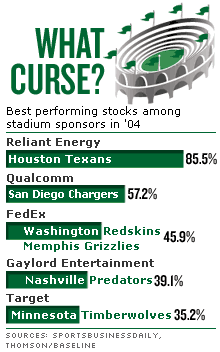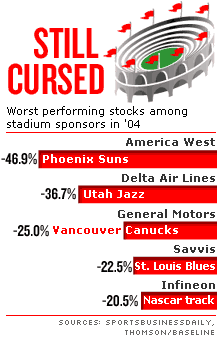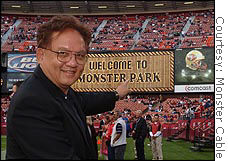
NEW YORK (CNN/Money) -
Clearly, 2004 was a bad year for sports curses.
The Super Bowl win by the AFL-born New England Patriots should have meant a losing year for stocks. It didn't. The defeat of the Washington Redskins in their last pre-election home game should have made John Kerry president. He isn't.
Then there was that curse -- you may have read about it -- involving some baseball team in Boston.
But the one I may mourn the most is the stadium sponsor curse, which held that after companies pay to put their names on stadiums, their businesses often swoon.
In the first two years I tracked the curse, it was a relatively effective early warning system, as nine companies with names on stadiums or arenas filed for bankruptcy. The stocks of the sponsors underperformed even the brutal bear market.
The curse presaged the bankruptcies of such giants as Enron, WorldCom and United Airlines, and the poor stock performance of other sponsors. It seemed a fitting punishment for excess corporate hubris.

In 2004, however, the curse lost its teeth. It was the worst year for the hex since I started tracking it four years ago.
The curse was already in trouble coming into last year. With the return of the bull market in 2003, the Stadium Sponsor Stock Index performed about as well as such blue chip measures as the Dow and S&P 500, although it trailed Nasdaq.
Still, 2003 at least produced one bankruptcy on the index, Air Canada. In 2004, there were no bankruptcies among the 51 companies with edifice complexes.
In fact, their stocks saw a healthy average gain of 10 percent during the year, better than the single-digit percentage gains seen by the Dow and S&P. Adjusted for market capitalization, the index performed even better, posting about 16 percent increase.

The two companies that gave up naming rights at the end of 2003 -- cell phone maker Ericcson (Research) and utility Edison International (Research) -- did see their stocks soar higher than almost any sponsor who kept their names on stadiums, with gains of 78 and 46 percent, respectively, in 2004. But that's not much to hang a curse on.
As I suggested last year, maybe part of the reason the curse is losing its teeth is that it has already weeded out the weaker companies, the dot-coms and those with funny accounting.
Most of the stadium sponsors whose stocks lost ground in 2004 were airlines, automakers or financial companies. Clearly, their naming rights deals weren't responsible for investor wariness about those sectors.
Fans backlash still going strong
It's also possible companies are learning their lessons about the limited value of such naming rights deals, especially since the names often rankle fans in the stands.
 |
|
| Monster Cable founder Noel Lee wasn't surprised by voters opposing against corporate names on the former Candlestick Park. |
In San Francisco, the home of the 49ers football team got its third name change in less than 10 years, when it became Monster Park in September. That replaced the traditional name Candlestick Park, which itself had returned to replace the 3Com (Research) name that it carried from 1995 to 2001.
The four-year, $6 million naming rights deal by privately-held Monster Cable produced some voter backlash. A proposition that would ban any future corporate naming deals for a stadium on that site passed with 55 percent of the vote.
"When the measure appears on the ballot, it doesn't present the whole case," said Monster Cable founder Noel Lee. "It doesn't ask if they want money for parks and recreation. It just basically asks people if they like the name Candlestick."
| SportsBiz
|
| Click here for SI.com sports coverage |
|
|
Lee said he doubts his deal is a sign that smaller companies will be racing to grab naming rights in the coming year. He said his was a one-off decision, not part of some grandiose publicity strategy. The short-term nature of his deal made it possible.
"If it was a marketing decision, I wouldn't have done it," he said. "There's a lot better use of marketing dollars."
Boston Garden's return out of reach
Bank of America (Research) came to much the same conclusion recently.
The bank started 2004 by putting its name on the football stadium in its hometown of Charlotte, a deal reportedly worth $7 million a year for 20 years.
But after BofA closed on its purchase of Boston-based Fleet Bank during the year, it started weighing what name should go on the Fleet Center, home of the Celtics and Bruins.
According to bank spokesman Joseph Goode, the name that tested best was Boston Garden. So the bank proposed using calling the building that for the remaining six years of its rights deal.
But Fleet's agreement with Delaware North, the arena's owner, required a renegotiation of the deal for any change of name.
The owners weren't ready to allow a switch without a significant increase in the $2 million annual payments previously agreed to by Fleet. And Bank of America wasn't interested in paying more for naming rights when they weren't going to use their own.
Delaware North also would have been hurt if the popular Boston Garden name had returned, even at an increased cost, because it would have hurt the value of the rights to a new sponsor after 2010. Negotiations never got to the point of deciding what Delaware North would have accepted for Bank of America to resurrect the Boston Garden name, according to someone familar with the talks.
On Wednesday, Bank of America and Delaware North announced the bank would give up its naming rights altogether, reportedly paying up to $3 million to get out of the deal. A new sponsor is expected in the next six months.
We'll see if the curse can come back to bite whoever steps up. Sadly, I doubt it will.

|

